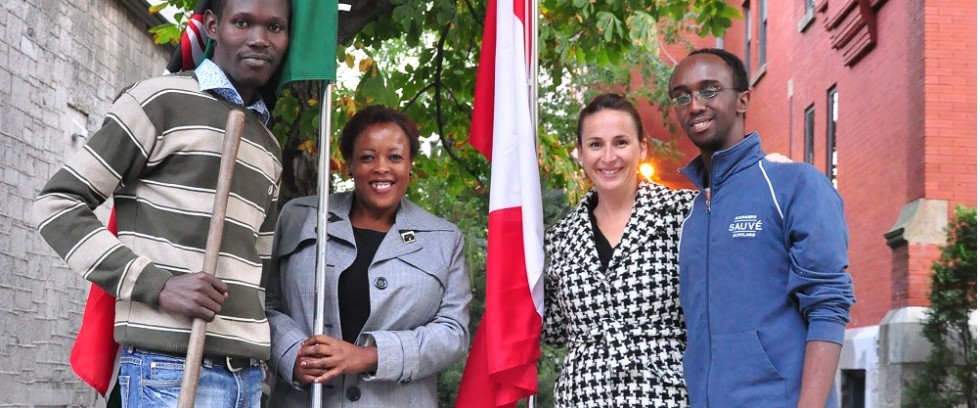
By Paul Omonge (Sauvé Scholar 2011-12 )
On Friday October 7th, 2011 the Jeanne Sauvé Foundation planted a tree in honour of the late Professor Wangari Maathai, who died on September 25th at the Nairobi hospital. This event coincided with other numerous tree planting events organised worldwide in honour of the 71 year-old 2004 Nobel Peace Laureate. In attendance were Madame Diane de Mailly-Nesle Sauvé, member of the Board of the Jeanne Sauvé Foundation; Executive Director Désirée McGraw and Simone Hanchet, Director of Communications; Kenyan human rights activist, politician and good friend of the Sauvé Foundation, Flora Igoki Terah, who is the Founder and Director of the NGO Terah against Terror; and the 2011-2012 Scholars.
After brief introductions led by Madame McGraw, Esmael Omar Njuguna, Sauvé Scholar from Kenya, was the first to share thoughts on the life of the late heroine from rural Kenya. Aptly, he traced her roots from a rural school in Nyeri to her travels across the globe, her organisation, the Green Belt Movement and her ultimate prize, The Nobel Peace prize. A prize that was awarded to her “for her contribution to sustainable development, democracy and peace” in Kenya and Africa. This narration reminded me of an excerpt from the will of Alfred Bernhard Nobel, penned on the 27th of November 1895. That the Peace Prize be given to “the person who shall have done the most or the best work for fraternity between nations, for the abolition or reduction of standing armies and for the holding and promotion of peace congresses.” Indeed Wangari had been a woman of ‘firsts’, she managed to break several barriers for women in Africa and challenged the status quo when it was considered suicidal at the time to do so. I was next and I talked about my three encounters with the good professor during my time as a student at the University of Nairobi and afterwards. These encounters, however brief, inspired me not to waver in my convictions. Wangari never wavered. One of Wangari’s quotes that I shared with the gathering was an address to the students at the University of Nairobi in 2004. She said: You are now getting the education you wanted, if you use it to move this country forward, we will support you. But if you use it to bring this country down, we shall fight you! I cannot forget the seriousness of her words and her desire to see my country progress economically, socially and morally. Flora Terah, a very close friend of Wangari Maathai, spoke next. She talked of her friendship with the Professor. She talked of her struggles against the regime and her subsequent arrests. She simply called her ‘Wangari’, an affectionate way to address her close friend. “Wangari was among the first people to comfort and support me after my attack, she told me not to let my adversaries break my spirit, and I feel Kenya, and indeed the world has lost a courageous woman who made it possible for women to speak out against gender injustices in my country”. She implored the gathered group not to betray nor relent from the cause and vision that was synonymous with Wangari Maathai.
After her speech, each participant then added soil to the newly planted tree as a symbol of remembrance and commitment to the work that Wangari represented the world over. The photo session, outside the Sauvé House, was significant in two ways. First, both flags together signified the harmonious relationship that exists between the two nations. Secondly, it invites the Foundation to look back with responsibility and pride as Sauvé House was the location of the last official and public appearance of Wangari Maathai on Canadian soil in 2009. To the group gathered outside in the evening, the humble Fall breeze that blew both the Canadian and the Kenyan flags this way, then that way, was a good reminder that life is a journey through which we all must travel. However, we must make the travel meaningful and comfortable to ourselves, those around us and those to come. The role we play can be as simple as talking to each other, as Wangari did with the women, but achieve more like she did. To quote her words: It is the little things that citizens do. That’s what will make a difference. Mine is to plant trees then again, I am working to make sure we don’t only protect the environment, we also improve governance Standing majestically fresh and in a defiant pose, the young Pine tree that was planted is strategically placed on the left side of the entrance to the Maison Jeanne Sauvé, visible to all and sundry. A constant reminder that this place (the house), shall continue to inspire young people to go out of their way and do little things that make huge differences the world over.
